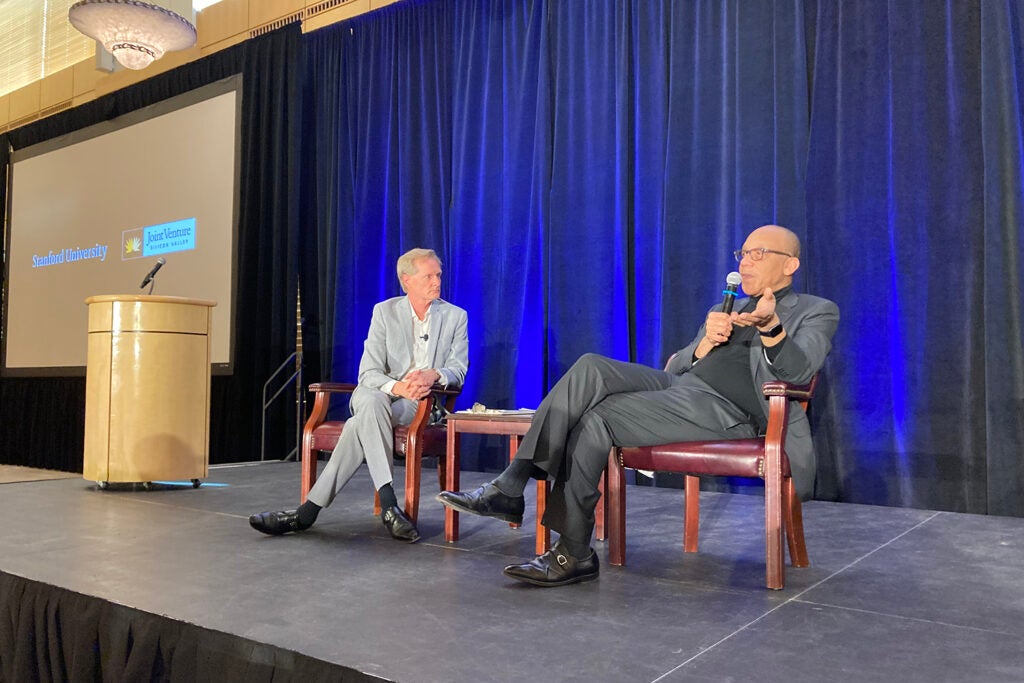State of the Valley Conference, the ‘town hall of Silicon Valley,’ held at Stanford
Joint Venture Silicon Valley and Stanford co-presented the event, which was the inaugural Stanford Office of Community Engagement Regional Forum, envisioned as a series of events that showcase regional collaboration and advance the university's mission.
Stanford President Marc Tessier-Lavigne opened the 2022 State of the Valley Conference at the Frances C. Arrillaga Alumni Center on Friday, the first time the annual “town hall of Silicon Valley” has been held at Stanford, and the first with an in-person component since shelter in place began in March 2020.

Russell Hancock, left, and Eugene Robinson speak at the 2022 State of the Valley Conference at the Frances C. Arrillaga Alumni Center on Friday. (Image credit: Lisa Chung)
“At Stanford, we’ve rolled out a vision for the future of the university with the goal of amplifying our impact so that we can make bold contributions and do our part to address the great challenges we face around the world, and also here at home,” Tessier-Lavigne said in a prerecorded video address to the two hundred attendees gathered in McCaw Hall and the nearly 900 who joined online.
More than 200 Stanford students, staff and faculty members signed up to attend, reflecting another facet of the Stanford vision that Tessier-Lavigne referenced in his remarks: Preparing citizens and leaders, and building purpose through truly understanding the challenges in the region.
Joint Venture Silicon Valley and Stanford co-presented the event, which is the inaugural Stanford Office of Community Engagement Regional Forum, envisioned as events that showcase regional collaboration on timely topics and advance the university mission. In his welcome, Tessier-Lavigne used the occasion to emphasize Stanford’s commitment to “leaning into our role” at a critical time: contributing to solutions as the region faces multiple challenges.
“Stanford has been such a strong voice in, and contributor to, the regional dialogue since the outbreak of the pandemic,” said Russell Hancock, president and CEO of Joint Venture Silicon Valley (AM ’92, PhD ’93).
Planning for the 2022 conference came at a time when Stanford’s Office of Community Engagement was conceiving of ways to support regional forums on topics of mutual concern.
“Stanford is pleased to have co-presented this year’s event as we work to enhance a more purposeful engagement between the campus and the communities we touch,” said Martin Shell, vice president and chief external relations officer. “The teaching and research mission of Stanford helps to develop solutions to some of the most challenging issues facing our region and world. The university’s graduates also are making vital contributions to every facet of society. We were honored that Stanford and its campus could serve as a convener of people and perspectives from across the region.”
The State of the Valley Conference typically brings together more than 1500 Bay Area business leaders, government officials, academia, labor and community leaders, journalists and residents to discuss Silicon Valley’s economic health and well-being.
The pandemic necessitated a virtual gathering in 2021, a change that facilitated wider geographical participation than in person, said Joint Venture’s communications director, Robin Doran.
This year’s conference, which was a hybrid of in-person and online via Zoom, included a presentation by Santa Clara County Poet Laureate Tshaka Campbell, a performance by the students from Stanford Taiko and Stanford Talisman’s Alumni Virtual Choir’s rendition of “Lift Every Voice and Sing.”
The 2022 Silicon Valley Index provided insight into regional trends and challenges, particularly when viewed through an equity lens. Caroline Simard, the managing director of VMWare Women’s Leadership Innovation Lab at Stanford, moderated a discussion of the index findings with Michele Lew, the CEO of the Health Trust, and Jim Wunderman, president and CEO of the Bay Area Council. The index findings can be seen here.
Keynote speaker Eugene Robinson, a Washington Post columnist whose writing about the 2008 presidential campaign and the election of the first African-American president won him a Pulitzer Prize, closed the conference with his thoughts about Silicon Valley from the national perspective, the consideration of equity and inclusion in Silicon Valley and the threats to democracy and voting access.